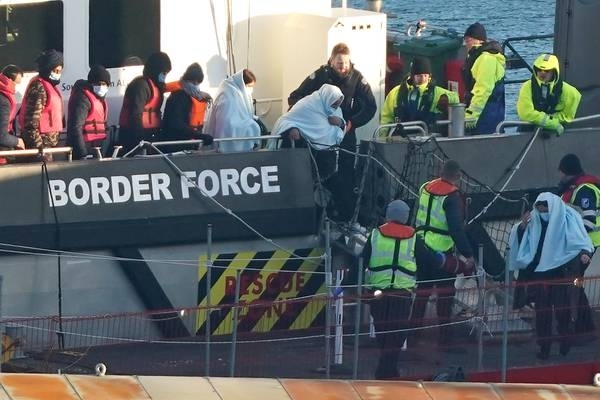Middle East earthquake rescue efforts hampered as death toll passes 7,000

Aftershocks, freezing temperatures and damaged roads are hampering efforts to tackle the enormous humanitarian emergency triggered by Monday’s 7.8-magnitude earthquake in southern Turkey and northern Syria, with 7,200 people now confirmed dead and 380,000 others seeking refuge in Turkey alone. As the scale of the devastation from the initial quake – and a second tremor – became clearer, the Turkish authorities declared a state of emergency in 10 provinces and the World Health Organization warned that the number of fatalities could exceed 20,000. By Tuesday evening, the death toll in Turkey and Syria had passed 7,220. Turkey’s health minister, Fahrettin Koca, said more than 5,400 people had died and about 32,000 had been injured. The death toll in government-held areas of Syria climbed past 800, with some 1,400 injured, according to the health ministry. In the rebel-held north-west of Syria, the White Helmets emergency rescue organisation said at least 900 people had died and more than 2,300 had been injured. People in remote towns in southern Turkey described how relief efforts were stretched to breaking point, amid destruction over a border region spanning almost 650 miles. In rebel-held northern Syria, volunteer rescue workers said they lacked fuel and some of the most basic provisions required to pull those still trapped under the rubble of their homes. An unknown number of people remain trapped and efforts to find survivors have been frustrated by frigid conditions. Poor internet connections and damaged roads between some of the worst-hit cities in Turkey’s south, home to millions of people, also hindered rescue teams. A spokesperson for the United Nations office for the coordination of humanitarian assistance said the flow of critical aid from Turkey to north-west Syria had been temporarily halted on Tuesday morning as a result of damage to roads and other logistical issues. She added: “We don’t have a clear picture of when it will resume.” Turkey’s disaster management agency said it had received 11,342 reports of collapsed buildings – of which 5,775 had been confirmed – while more than 8,000 people had been pulled from the debris. According to the Turkish authorities, some 380,000 were in government shelters or hotels; others had sought safety in shopping malls, stadiums, mosques and community centres. We often define major earthquakes as disasters. This is more than an earthquake, this is a disaster Murat Harun Öngören, a coordinator with Akut, Turkey’s largest civil society aid and rescue organisation, said efforts to reach those affected across southern Turkey had been severely impeded by the cold weather and icy conditions – as well as the sheer size of the affected area. “We often define major earthquakes as disasters. This is more than an earthquake, this is a disaster,” he said. In Syria, the effects of the quake were compounded by the destruction brought on by more than 11 years of civil war. A senior UN humanitarian official said fuel shortages in Syria and the harsh winter weather were also creating obstacles to its response. “The infrastructure is damaged, the roads that we used to use for humanitarian work are damaged, we have to be creative in how to get to the people … but we are working hard,” UN resident co-ordinator El-Mostafa Benlamlih told Reuters. In the rebel-held areas of northern Syria, rescuers workers toiled through the night to find civilians still trapped under the rubble, while others attempted to find shelter in the freezing rain. On Monday – speaking when the estimated toll stood at 2,600 – Catherine Smallwood, the WHO senior emergency officer for Europe, said the death toll could increase “eightfold” on the initial numbers. Syria said on Monday that aid sent after the earthquake would reach all its population, even though Damascus does not control all of its territory. Turkish president Recep Tayyip Erdoğan declared a three-month state of emergency covering Turkey’s 10 southern provinces hit by the earthquakes, and called it a disaster zone in a move meant to bolster rescue efforts. Declaring a state of emergency permits the president and cabinet to bypass parliament in enacting new laws and to limit or suspend rights and freedoms as they deem necessary. Mr Erdoğan said the state of emergency would last three months, meaning it would end shortly before presidential and parliamentary elections are scheduled on May 14th . – Guardian; additional reporting: Reuters
Small boats to Dover are big political issue for Britain
Map showing extent of sewage released into Thames shocks many Londoners
:quality(70)/cloudfront-eu-central-1.images.arcpublishing.com/irishtimes/5KRKPL5NEI3OKEC2YCHUQ3O6YI.jpg)
German drug dealer who inspired Netflix show is back in court
:quality(70)/cloudfront-eu-central-1.images.arcpublishing.com/irishtimes/UM5XI5JSANAIXDNT4GPMWORKME.jpg)
Iran’s artistic community divided over its reaction to protests
:quality(70)/cloudfront-eu-central-1.images.arcpublishing.com/irishtimes/X3UKYJDFTRCL5LLAE2XG4RBQJA.jpg)



